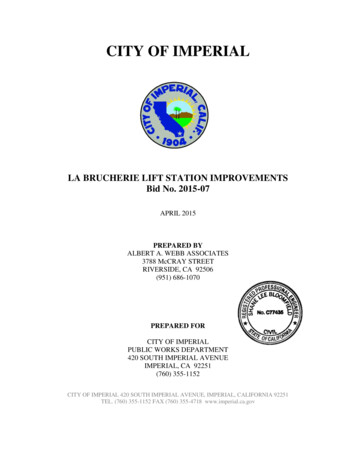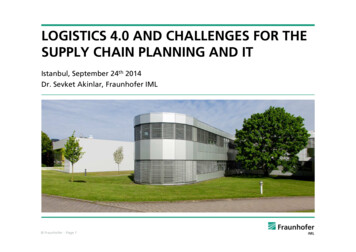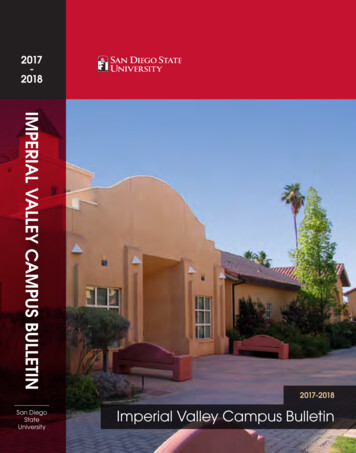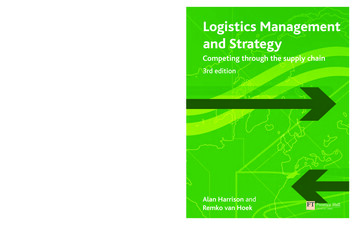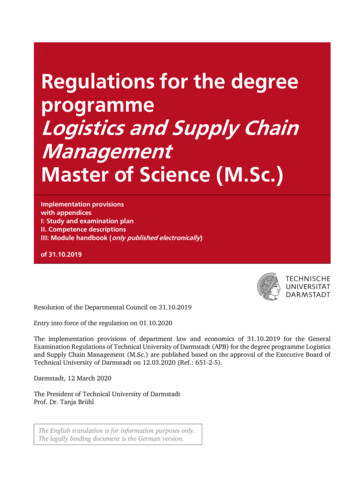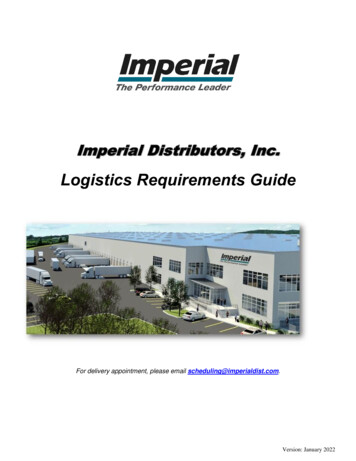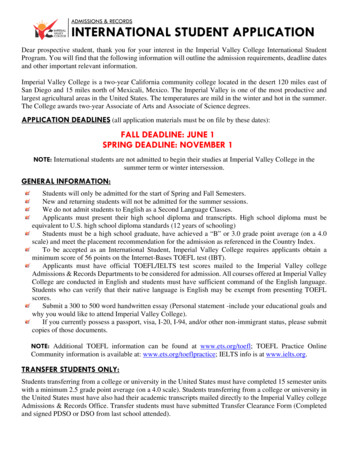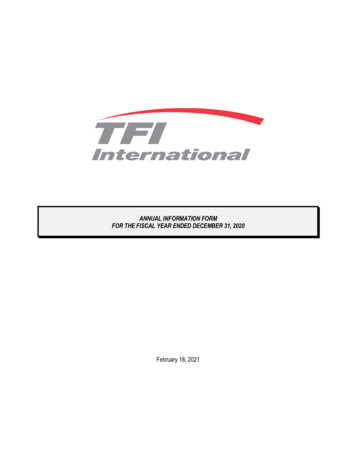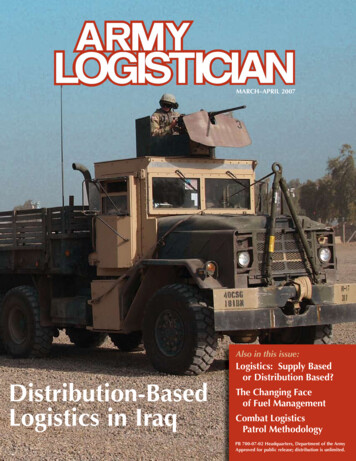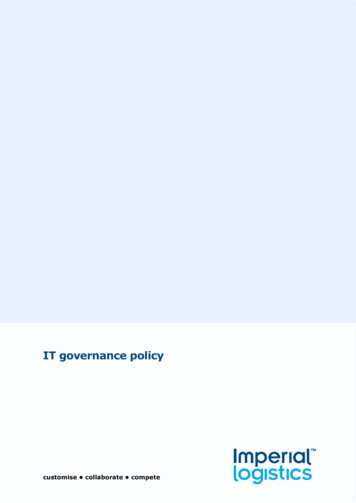
Transcription
IT governance policycustomise collaborate compete
Table of contents1 Purpose12 IT governance13 Key principles24 Imperial Logistics IT governance framework35 Responsibilities46 Implementation policy5
1 PurposeThis document establishes the principles and standards for the governance ofInformation Technology (IT) within the Imperial Logistics Group (ImperialLogistics).IT governance is the responsibility of the Imperial Logistics Board, whichdelegates this task to the Group Risk Committee. The design and managementof the IT governance system is delegated to the divisional chief informationofficers.2 IT governanceIT governance is an integral part of enterprise governance and consists of theleadership and organisational structures and processes that ensure that theorganisation’s IT sustains and extends the organisation’s strategy andobjectives.The objective of IT governance is to direct IT endeavours and to ensure that IT’sperformance meets the following objectives: Alignment of IT with the enterprise and realisation of the promisedbenefits Use of IT to enable the enterprise by exploiting opportunities andmaximising benefits Responsible use of IT resources Appropriate management of IT-related risksIn summary, IT governance ensures that IT goals are met and IT risks aremitigated such that IT delivers value to sustain and grow the enterprise. ITgovernance drives strategic alignment between IT and the business and mustjudiciously measure performance.IT governance policy1
3 Key principlesThe IT Governance Policy is guided by the governance principles of King IV,aligned to the group’s IT governance baseline and complies with legislation as itconcerns IT governance within the applicable industries in which the groupoperates.The King Report on Governance for South Africa (King IV) outlines in chapter 5.4the Governance of Information Technology (IT) providing Principle 12 whichstates that the governing body should govern technology and information in away that supports the organisation setting and achieving its strategic objectives.In addition, King IV provides 8 recommended practices.Due to the diverse nature of operations, Imperial Logistics has adopted sevengovernance baseline principles for the development and implementation of aninformation technology governance framework. These principles incorporatestandards included in KingIV, COBIT, ITIL and ISO and starts from the premisethat IT needs to deliver the information that the enterprise needs to achieve itsobjectives.The seven Imperial Logistics governance baseline principles are: Business alignment and enablement focuses on ensuring the linkage ofbusiness and IT plans, defining, maintaining and validating the IT valueproposition, and aligning IT operations with enterprise operations. Operations performance is about ensuring IT is capacitated with the rightpeople who are developed and empowered and ensuring optimal ITprocesses and measurements are deployed. Sourcing requires responsible and adequate procurement of IT hardwareand software and the correct selection and vetting of IT partners andsuppliers.IT governance policy2
Supplier performance management outlines practices regarding theimplementation and monitoring of service level agreements andcommercial agreements Business continuity / disaster recovery details requirements and practicesregarding the processes to ensure IT impacted disruptions Security promotes our views regarding data privacy, cybersecurity anduser access Compliance sets out guidance in respect of internal monitoring andexternal assurance4 Imperial Logistics IT governance frameworkThe governance framework in the use of IT within Imperial Logistics is definedas follows: The Imperial Logistics Board has assumed responsibility of IT governanceand, as such, has placed it on the Group Risk Committee’s charterensuring promotion of an ethical IT governance culture and awareness.The Imperial Logistics governance baseline principles have been adoptedto ensure that IT internal controls are adequate. Independent assuranceon the effectiveness of the IT internal controls are provided by internal(group audit services) and external (Deloitte) auditors. The activities and functions of the IT strategy are aligned to the businessstrategy and opportunities to improve the use of IT within ImperialLogistics are identified and exploited by the Board. The optimal investment is made in IT, costs are managed and the returnon investment is measured by the relevant divisional boards and oversightcommittees. Where applicable, synergies between IT initiatives areenabled and IT choices are in the best interest of the organisation as awhole.IT governance policy3
IT risks are identified and adequately addressed in line with the ImperialLogistics Risk Management Framework. Imperial Logistics ensures that ithas adequate business resilience arrangements in place for disasterrecovery and assurance has been provided to the Board. IT resources are sourced optimally and legitimately, keeping corecapabilities in-house. Processes and procedures are in place to ensure that Imperial Logistics’ ITassets are managed, maintained, replaced and disposed of effectively andin accordance with the IT policy. Infrastructure, systems and policies are in place for the management ofinformation which includes information security and information privacy. The audit committee considers IT as it relates to financial reporting andthe going concern of the company by regular and risk-based auditcoverage. IT use is sustainable with respect to the environment.5 ResponsibilitiesImperial Logistics’ board carries out its governance duties through variouscommittees that oversee the governance of IT. IT governance is applied at threelevels: strategic, tactical and operational. For the purposes of this document, thekey committees that oversee IT governance are: The Imperial Logistics Board of Directors, the Group Risk Committee andthe Group Audit Committee at a strategic level; The group’s executive committees and regional CIO forums at a tacticallevel; and The IT steering committee and project committee at the operational level.IT governance policy4
6 Implementation of policyThe IT governance policy will be rolled out across the Imperial Logistics Group. Itneeds to be embraced by Imperial Logistics and its related processes filtered intothe daily IT operations and the way we do business.IT governance policy5
The governance framework in the use of IT within Imperial Logistics is defined as follows: The Imperial Logistics Board has assumed responsibility of IT governance and, as such, has placed it on the Group Risk Committee's charter ensuring promotion of an ethical IT governance culture and awareness.
